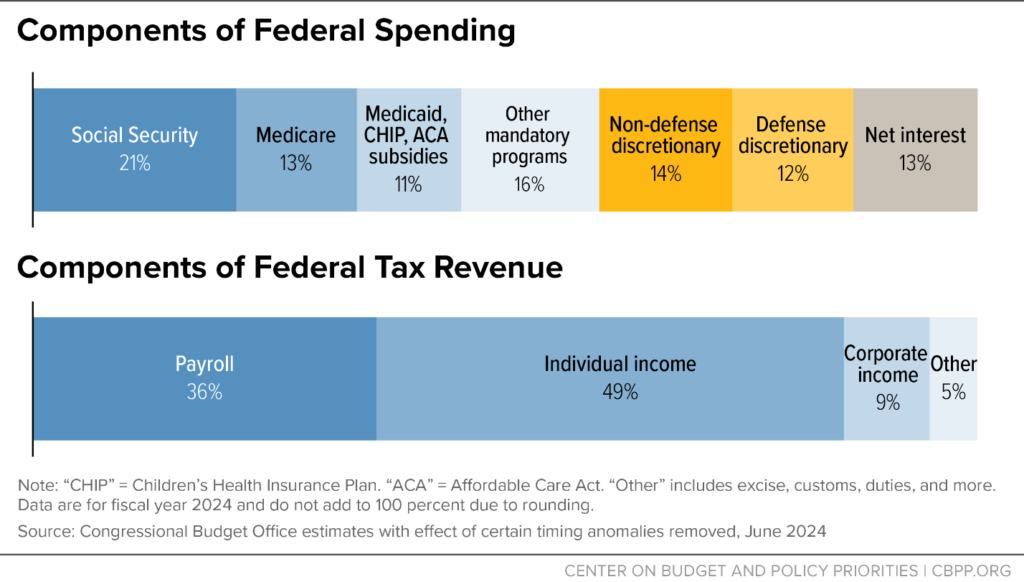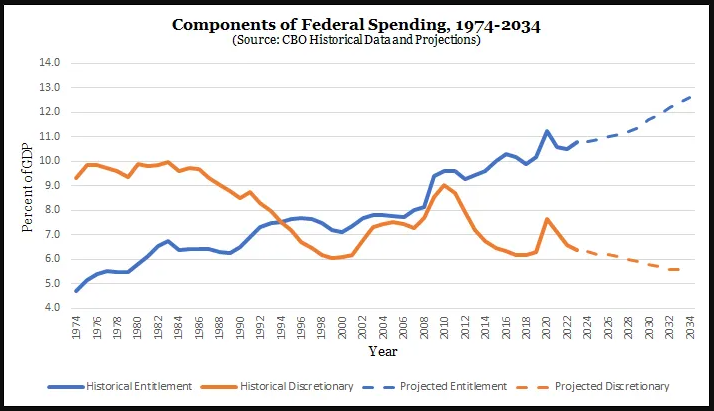There are serious issues with America’s federal budget. Very serious issues.
Where to begin?
Let me first start with the process of budgeting, that process of drafting a plan for raising revenue and spending it. Congress often does not adopt a budget. In 2024, the House of Representatives passed a resolution; the Senate did not. For his part, President Joe Biden delivered his budget late. These days, Congress tends to go through the bother of passing a budget only so that whichever party holds a majority can ram policy changes through the reconciliation process (which can evade filibuster in the Senate.)
Next, there are the spending bills themselves. The 1974 Congressional Budget and Impoundment Control Act would have Congress adopt a budget and enact all 12 appropriations bills before September 30. That rarely happens. None of the fiscal year 2025 spending bills were signed into law in 2024. As I write in January 2025, the country is under a continuing resolution adopted in December of 2024, which simply extends the previous continuing resolution, which extended the resolution adopted when Congress and the president could not sign the bills by September 30.
Failing to enact the spending bills has costs. It creates waste in the form of forcing agencies to spend time preparing for a government shutdown rather than the work they are supposed to do. It means that programs that are not working keep getting tax dollars, and that agencies that have legitimate needs for additional dollars (e.g., due to inflation or new tasks to complete) do not get them.
No discussion of the budget’s procedural troubles would be complete with mention of tax policy, which raises revenues. The code is a baroque mess because it is largely the product of lobbying. Nobody can argue that it collectively makes sense as a matter of principle or policy. But what’s really astonishing is that tax policy is crafted largely separate from the annual debates over spending, according to a former head of the House’s tax policy committee. Is it any wonder our revenues and expenditures are grossly out of kilter?
And speaking of which, there is the budget itself. With each passing year, it increasingly consists of transfer payments—moving money from some individuals and companies to others. Most federal spending today goes to the entitlement programs: Social Security, Medicaid, Medicare, and the like. By law, these programs grow automatically in cost every year, and they do not have a dedicated funding stream that is structured to grow with them. So, for example, Social Security is predicted to empty its trust fund by 2035. When that happens, Social Security checks will be reduced by 17 percent immediately, and by a higher percentage over the ensuing years.

Source: Center on Budget and Policy Priorities.
As entitlements have come to consume more and more of the budget one effect is that there is less of a budget to expend on all the important things, which, unsurprisingly, intensifies the political conflicts around these other expenditures. Legislators rail over a few billion dollars spent on a failed government program while entitlement spending drives trillion-dollar deficits. Additionally, autopilot spending produces various distortions in priorities. For example, the federal government is transferring increasingly immense amounts of money from young adults and recent immigrants to older Americans. While supporting our elders is critical, so is investing in the young who are the future of the nation.
Last, I must mention, debt. Late this last summer, President Joseph Biden’s White House delivered to Congress its “Mid-Session Review” of the federal budget. The bottom line was bad: The deficit for 2024 was going to be higher than expected ($1.87 trillion) and the nation would be $37 trillion in debt by the end of the year. Consider: America’s debt was around $12 trillion in 2012. We now are running annual deficits of a trillion or more. I am old enough to recall when we had total annual budgets of $1 trillion. That was 1990. The money spent on serving the debt (paying the interest) recently surpassed the money spent on national defense.
Does anyone think the country is engaged in sound budgeting? The question answers itself.
~
Yet, amid all this bad news about federal finances what do we see? Unserious politics, mostly.
Last year election’s featured politicians from both parties competing for the public’s vote by dangling fiscally reckless policies as carrots.
Never mind the deficits, they said, let’s cut taxes on wages earned from tips and make overtime untaxed. Let’s give everyone $25,000 to buy a home. Let’s abolish debt freely borrowed by college students. Let’s extend the tax cuts we made in 2017. Let’s pay people to have children while at the same time continuing to subsidize birth control and abortions. While campaigning in Kittanning, Pennsylvania, incoming president Donald J. Trump gave a grocery store customer some cash, and then said, “We’ll do that for you from the White House, all right?” Who would give Mr. Trump the money to hand out to the tens of millions of pleading hands went unsaid. Talk of raising taxes to pay for these promises is inevitably lacking from Republicans, and from Democrats consist of chants to “Make the rich pay their fair share.” (Never mind that the wealthy pay most of the nation’s income taxes and that raising their taxes further would not cover the costs of current spending let alone the costs of new programs.)
Further symptomatic of the unseriousness is that people in high positions in the government discussed minting trillion dollar coins to deposit in the US Treasury to decrease our debt. Yes, really.
Now, the reader may wonder if I am being too harsh on the politicians and too dour in outlook. “Trump and Republicans are promising to cut spending, and they are partnering with Elon Musk and Vivek Ramaswathy to create a Department of Government Efficiency and abolish agencies like the Department of Education.”
All true, and I wish them luck in bettering our nation’s finances. But there are words and there are deeds.
Yuval Levin recently observed, “The notion that a committee of billionaire tech executives with no political experience is going to massively reduce federal spending by focusing on waste is just the kind of banal delusion that causes Washingtonians to roll their eyes.”
Again, most government spending goes to entitlements, the compensation of military and federal civilian employees, and important stuff (military weapons, roads, etc.)—not $8,395 lobster tanks or Diversity, Equity, and Inclusion training programs.

Source: Yuval Levin in National Review.
Moreover, reducing spending necessitates convincing legislators and the president that the voters will not punish them for reducing costs. It means telling interest groups and campaign donors “No, we’re not going to spend more on this policy you like. We’re going to cut it or abolish it outright.” Abolishing agencies requires working through the difficult matters of which programs to keep and which to get rid of, and where to assign the former.
~
For sure, politics always has had its silly and outright idiotic aspects. Politicians may be forgiven for their boobery when the issues are trivial.
But the matters here are serious. Soaring deficits and debt and slapdash budgeting are eroding trust, which is the bedrock of governance and economics. Think about it: You can hand someone $10 for a good or service and they will accept it because they trust the money is going to retain its value and be usable to spend or invest. You lend someone dollars because you believe they can and will pay you back.
The same holds true for nations.
The American dollar is the rock of the international monetary system. The United State’s debt to gross domestic product ratio is at sky high. Nearly 40 percent of millennials and 35 percent of Generation Z Americans think they will never see a dime of the money they paid into Social Security. The bond market is giving signs it is worried about America’s national finances. How much longer will nations, investors, and consumers trust that the dollar is worth something and that America will pay back money it borrows?
In 2008 we saw what can happen when confidence is lost in big money institutions. Banks and other financial institutions said they had mortgaged-backed securities and other assets that were worth real money, but the market deemed otherwise. The global economy tanked, giant companies were wiped out, and massive damage was done.
Undoubtedly, politicians deserve some blame for the shoddy state of America’s finances. So do we voters. We elected them, and very few of us go to the balance box to vote for or against a candidate based on their fiscal and tax policy stands. Americans dislike deficits and debt but don’t vote that way. Our happiness with getting more government support and more tax cuts leaves us with politicians who have little incentive to do anything other than engage in unserious behavior amid the serious problems.
We voters must quit behaving as if elected officials are suddenly going to get serious about the nation’s budget. If recent history tells us anything, it is that we cannot assume that presidents and legislators will be responsible stewards of the federal budget.
We need to make elected officials feel that budgeting is an important issue, one on which each of us will base our vote. We can do that by contacting our senators and members of Congress to tell them, “You must reduce our deficits, I want you to reduce our deficit, and I intend to hold you accountable when I vote.”
Representative democracy is a collective enterprise. We get the politicians we choose. Until we do our part, America’s budget will further erode until we have an economic crisis.
And that would be an exceedingly stupid and costly course to follow.
Kevin R. Kosar (@kevinrkosar) is a senior fellow at the American Enterprise Institute. He hosts the Understanding Congress podcast and edits UnderstandingCongress.org.
Stay in the know about our news and events.